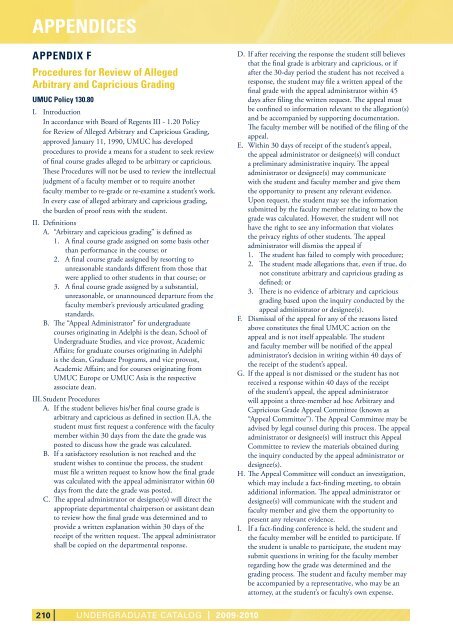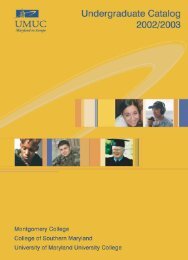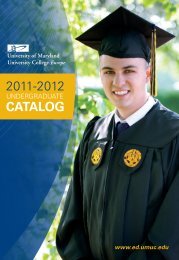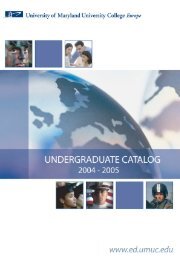UNDERGRADUATE CATALOG - UMUC Europe
UNDERGRADUATE CATALOG - UMUC Europe
UNDERGRADUATE CATALOG - UMUC Europe
You also want an ePaper? Increase the reach of your titles
YUMPU automatically turns print PDFs into web optimized ePapers that Google loves.
APPEndiCEs<br />
APPEndix F<br />
Procedures for Review of Alleged<br />
Arbitrary and Capricious grading<br />
umuC Policy 130.80<br />
I. Introduction<br />
In accordance with Board of Regents III - 1.20 Policy<br />
for Review of Alleged Arbitrary and Capricious Grading,<br />
approved January 11, 1990, <strong>UMUC</strong> has developed<br />
procedures to provide a means for a student to seek review<br />
of final course grades alleged to be arbitrary or capricious.<br />
These Procedures will not be used to review the intellectual<br />
judgment of a faculty member or to require another<br />
faculty member to re-grade or re-examine a student’s work.<br />
In every case of alleged arbitrary and capricious grading,<br />
the burden of proof rests with the student.<br />
II. Definitions<br />
A. “Arbitrary and capricious grading” is defined as<br />
1. A final course grade assigned on some basis other<br />
than performance in the course; or<br />
2. A final course grade assigned by resorting to<br />
unreasonable standards different from those that<br />
were applied to other students in that course; or<br />
3. A final course grade assigned by a substantial,<br />
unreasonable, or unannounced departure from the<br />
faculty member’s previously articulated grading<br />
standards.<br />
B. The “Appeal Administrator” for undergraduate<br />
courses originating in Adelphi is the dean, School of<br />
Undergraduate Studies, and vice provost, Academic<br />
Affairs; for graduate courses originating in Adelphi<br />
is the dean, Graduate Programs, and vice provost,<br />
Academic Affairs; and for courses originating from<br />
<strong>UMUC</strong> <strong>Europe</strong> or <strong>UMUC</strong> Asia is the respective<br />
associate dean.<br />
III. Student Procedures<br />
A. If the student believes his/her final course grade is<br />
arbitrary and capricious as defined in section II.A, the<br />
student must first request a conference with the faculty<br />
member within 30 days from the date the grade was<br />
posted to discuss how the grade was calculated.<br />
B. If a satisfactory resolution is not reached and the<br />
student wishes to continue the process, the student<br />
must file a written request to know how the final grade<br />
was calculated with the appeal administrator within 60<br />
days from the date the grade was posted.<br />
C. The appeal administrator or designee(s) will direct the<br />
appropriate departmental chairperson or assistant dean<br />
to review how the final grade was determined and to<br />
provide a written explanation within 30 days of the<br />
receipt of the written request. The appeal administrator<br />
shall be copied on the departmental response.<br />
210<br />
UndERGRAdUATE CATALoG | 2009-2010<br />
D. If after receiving the response the student still believes<br />
that the final grade is arbitrary and capricious, or if<br />
after the 30-day period the student has not received a<br />
response, the student may file a written appeal of the<br />
final grade with the appeal administrator within 45<br />
days after filing the written request. The appeal must<br />
be confined to information relevant to the allegation(s)<br />
and be accompanied by supporting documentation.<br />
The faculty member will be notified of the filing of the<br />
appeal.<br />
E. Within 30 days of receipt of the student’s appeal,<br />
the appeal administrator or designee(s) will conduct<br />
a preliminary administrative inquiry. The appeal<br />
administrator or designee(s) may communicate<br />
with the student and faculty member and give them<br />
the opportunity to present any relevant evidence.<br />
Upon request, the student may see the information<br />
submitted by the faculty member relating to how the<br />
grade was calculated. However, the student will not<br />
have the right to see any information that violates<br />
the privacy rights of other students. The appeal<br />
administrator will dismiss the appeal if<br />
1. The student has failed to comply with procedure;<br />
2. The student made allegations that, even if true, do<br />
not constitute arbitrary and capricious grading as<br />
defined; or<br />
3. There is no evidence of arbitrary and capricious<br />
grading based upon the inquiry conducted by the<br />
appeal administrator or designee(s).<br />
F. Dismissal of the appeal for any of the reasons listed<br />
above constitutes the final <strong>UMUC</strong> action on the<br />
appeal and is not itself appealable. The student<br />
and faculty member will be notified of the appeal<br />
administrator’s decision in writing within 40 days of<br />
the receipt of the student’s appeal.<br />
G. If the appeal is not dismissed or the student has not<br />
received a response within 40 days of the receipt<br />
of the student’s appeal, the appeal administrator<br />
will appoint a three-member ad hoc Arbitrary and<br />
Capricious Grade Appeal Committee (known as<br />
“Appeal Committee”). The Appeal Committee may be<br />
advised by legal counsel during this process. The appeal<br />
administrator or designee(s) will instruct this Appeal<br />
Committee to review the materials obtained during<br />
the inquiry conducted by the appeal administrator or<br />
designee(s).<br />
H. The Appeal Committee will conduct an investigation,<br />
which may include a fact-finding meeting, to obtain<br />
additional information. The appeal administrator or<br />
designee(s) will communicate with the student and<br />
faculty member and give them the opportunity to<br />
present any relevant evidence.<br />
I. If a fact-finding conference is held, the student and<br />
the faculty member will be entitled to participate. If<br />
the student is unable to participate, the student may<br />
submit questions in writing for the faculty member<br />
regarding how the grade was determined and the<br />
grading process. The student and faculty member may<br />
be accompanied by a representative, who may be an<br />
attorney, at the student’s or faculty’s own expense.






